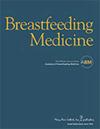母乳喂养医学学会立场声明:紧急情况下的母乳喂养。
IF 2.1
3区 医学
Q2 OBSTETRICS & GYNECOLOGY
引用次数: 0
摘要
背景:在自然灾害和武装冲突等紧急情况下,母乳喂养至关重要。母乳喂养可提供可靠的营养,并可预防传染病,而且无需清洁水、喂养工具、电力或外部供应。关键信息:保护、促进和支持母乳喂养应成为所有应急准备计划的组成部分。母乳喂养专家应成为计划制定的一部分。应急方案中应包括应急救援人员中的母乳喂养专家,为母乳喂养提供文化敏感性环境,并在分发食物/水时优先考虑照顾婴儿的人员。紧急救援人员应认识到,脱水和错过喂奶会影响乳汁分泌,但压力本身不会。紧急支持应侧重于让母亲和婴儿呆在一起,并为母亲提供私密和/或受保护的空间进行母乳喂养或挤奶。紧急支持还应侧重于快速识别有母乳喂养困难的母亲和分离的母乳喂养母婴,以便优先满足她们的需求。应为所有遇到困难的妇女提供母乳喂养支持,包括那些需要安慰的妇女。非母乳喂养的婴儿应被确定为需要优先支持的群体。对于非母乳喂养的婴儿,应考虑采用母乳喂养、湿护和捐献母乳的方式。紧急情况下不应接受商业配方奶粉 (CMF)、奶瓶或奶嘴或吸奶器的捐赠。商业配方奶粉的分发必须受到严格控制,只有在婴儿无法进行母乳喂养时才可提供,同时还应提供全面的一揽子支持服务。建议:应将保护、促进和支持母乳喂养纳入所有应急准备计划和人员培训中。本文章由计算机程序翻译,如有差异,请以英文原文为准。
Academy of Breastfeeding Medicine Position Statement: Breastfeeding in Emergencies.
Background: During emergencies, including natural disasters and armed conflict, breastfeeding is critically important. Breastfeeding provides reliable nutrition and protection against infectious diseases, without the need for clean water, feeding implements, electricity, or external supplies. Key Information: Protection, promotion, and support of breastfeeding should be an integral part of all emergency preparedness plans. Breastfeeding specialists should be part of plan development. Emergency protocols should include breastfeeding specialists among emergency relief personnel, provide culturally sensitive environments for breastfeeding, and prioritize caregivers of infants in food/water distribution. Emergency relief personnel should be aware that dehydration and missed feedings can impact milk production, but stress alone does not. Emergency support should focus on keeping mothers and infants together and providing private and/or protected spaces for mothers to breastfeed or express milk. Emergency support should also focus on rapidly identifying mothers with breastfeeding difficulties and breastfeeding mothers and infants who are separated, so their needs can be prioritized. Breastfeeding support should be available to all women experiencing difficulties, including those needing reassurance. Nonbreastfed infants should be identified as a priority group requiring support. Relactation, wet-nursing, and donor milk should be considered for nonbreastfed infants. No donations of commercial milk formula (CMF), feeding bottles or teats, or breast pumps should be accepted in emergencies. The distribution of CMF must be highly controlled, provided only when infants cannot be breastfed and accompanied by a comprehensive package of support. Recommendations: Protecting, promoting, and supporting breastfeeding should be included in all emergency preparedness planning and in training of personnel.
求助全文
通过发布文献求助,成功后即可免费获取论文全文。
去求助
来源期刊

Breastfeeding Medicine
OBSTETRICS & GYNECOLOGY-PEDIATRICS
CiteScore
4.20
自引率
11.10%
发文量
130
审稿时长
6-12 weeks
期刊介绍:
Breastfeeding Medicine provides unparalleled peer-reviewed research, protocols, and clinical applications to ensure optimal care for mother and infant. The Journal answers the growing demand for evidence-based research and explores the immediate and long-term outcomes of breastfeeding, including its epidemiologic, physiologic, and psychological benefits. It is the exclusive source of the Academy of Breastfeeding Medicine protocols.
Breastfeeding Medicine coverage includes:
Breastfeeding recommendations and protocols
Health consequences of artificial feeding
Physiology of lactation and biochemistry of breast milk
Optimal nutrition for the breastfeeding mother
Breastfeeding indications and contraindications
Managing breastfeeding discomfort, pain, and other complications
Breastfeeding the premature or sick infant
Breastfeeding in the chronically ill mother
Management of the breastfeeding mother on medication
Infectious disease transmission through breast milk and breastfeeding
The collection and storage of human milk and human milk banking
Measuring the impact of being a “baby-friendly” hospital
Cultural competence and cultural sensitivity
International public health issues including social and economic issues.
 求助内容:
求助内容: 应助结果提醒方式:
应助结果提醒方式:


